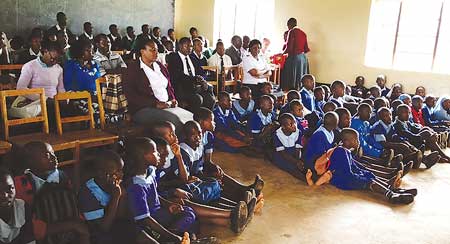
A new project educates kids on drug abuse and teen pregnancy in unique fashion.
Puppets took center stage at Kakamega Township Secondary School in Kakamega, Kenya, when 60 students put on a show for over 200 individuals, using 20 sock puppets and a wooden puppet stage built by inmates of the local prison. Through a series of skits, the students addressed issues relevant to their culture and community.
The performance culminated “Puppets for a Purpose,” a project developed by Salvationist and college senior Jessica Hodder that uses puppet theater as a tool for community bonding and education.
“Theater can be used to explore a number of social, economic and cultural issues within a wide variety of cultural, political and socio-economic contexts,” Hodder said.
Hodder brought the project to Kakamega Township, a Salvation Army-sponsored school established in 2005 that educates 385 students each year.
Over two weeks, participating students worked in groups to create skits addressing drug addiction, theft, teenage pregnancy, conflict over land and peer pressure. During the rehearsal process, the students considered their respective issues and determined how best to present them to the community.
“This is the best method that we can use to teach people in our community about issues that are affecting us,” said student puppeteer Samuel Kaduki.
Several participants expressed a desire to put on future puppet shows, specifically to address HIV/AIDS and other communicable diseases within the area.
“Theater, and indeed puppetry, is new in Western Kenya,” said Frederick Jacob Tali, principal of Kakamega Township. “Puppetry is successful because it combines learning with fun, and it makes students more active and participatory in the learning process. It also promotes peer teaching, because the students share with each other as they perfect their skills. I’m sure that if we continue to refine our skills using the new stage and puppets, other schools will learn and the trend will spread.”
Hodder hopes that puppetry will continue to inspire those in rural areas to breathe life into their stories, and create effective spaces for learning in the process.
“By playing upon Africa’s deeply rooted appreciation of stories and storytelling, this performance project proved successful in first appealing to community members and then addressing pertinent societal concerns,” Hodder said. “I am looking forward to seeing how Kakamega Township Secondary School utilizes the stage and puppets in the future.”












Iam one of the people who perticpate in this 3yrs ago it was fun,educative,amazing the project is encouraged